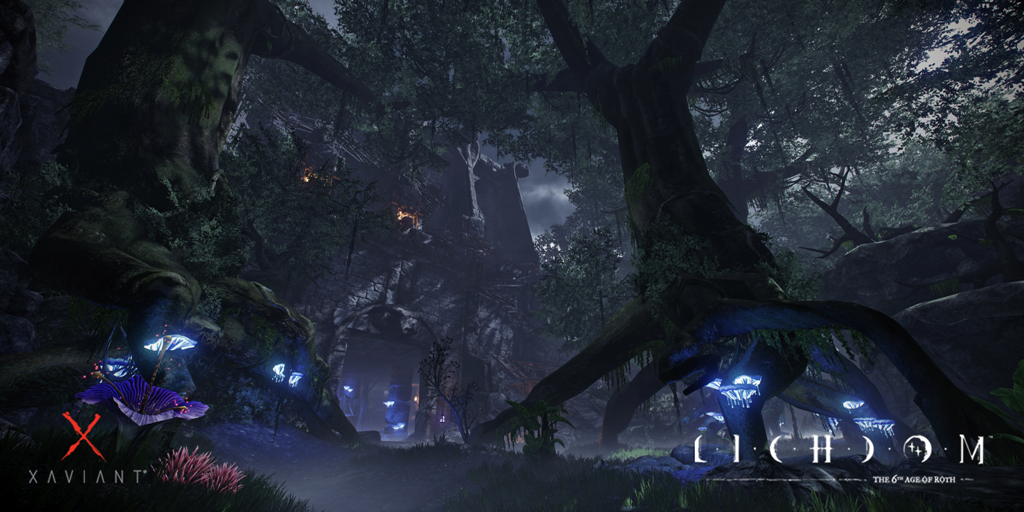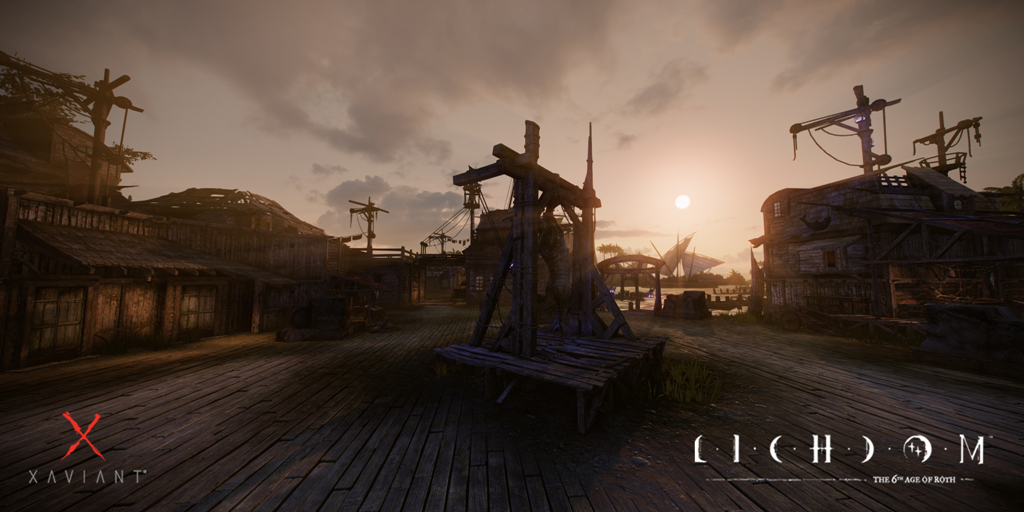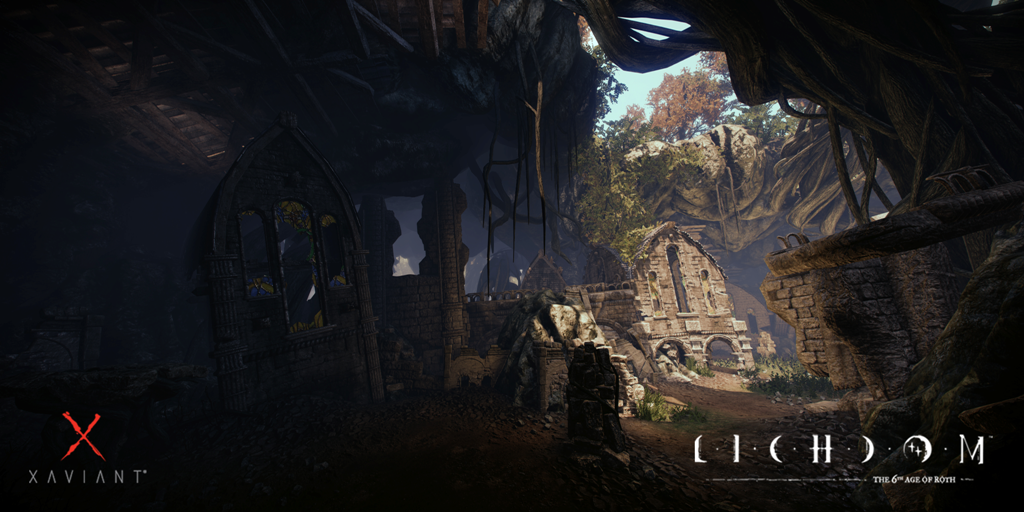The Art of Creating a Connection

Last week, we had an opportunity to hold an interview with Xaviant, a Georgia-based game development studio. Xaviant was formed in 2008 and since then, they’ve been prepping to turn the RPG world on its head. Their upcoming flagship title, Lichdom, brings to the table some interesting concepts and innovative gameplay. It’s a Cryengine 3-based RPG game, and the studio has more than a few tricks up its sleeve to make Lichdom stand out from the crowd.
After a brief tour of their amazing studio, we sat down with Xaviant head Michael McMain (CEO) and Tim Lindsey (Design Director), who were courteous enough to allow us an extended interview session, and also let us experience their game, Lichdom, firsthand.
(The initial portion of the interview was with Michael only, with Tim joining at a later time. Vernon Gomes, SpawnFirst’s Marketing Coordinator, conducted the interview along with me)
Karam: I just wanted to get an understanding of your background in the industry; how did you start and what did you do?
Michael: Before Xaviant, I was the CEO of RealTime Gaming, which is a company that developed software for the online casino industry. The owners decided that they didn’t want to be in that business anymore, so they sold it. At that point I decided that I wanted to move in the direction of developing my own games. I’ve been an avid gamer since I was a kid; and like many people that love to game, I had a dream of making my own. After RealTime Gaming, I was finally in a position to follow that dream, and that’s when I founded Xaviant.
“In my opinion, the best games make you forget about things like the controller and buttons. They immerse you completely in the combat, in the drama, in the story, the action, the lore.†Michael
Karam: What is the focus of the company, because you have this motto “You Will Feel Everything? And how are you instilling that value?
Michael: In my opinion, the best games make you forget about things like the controller and buttons. They immerse you completely in the combat, in the drama, in the story, the action, the lore. A game fails when it pulls you out of the moment. For example, when you’re hitting the X button when you should’ve hit the Y. Our goal is to deliver experiences that take you out of yourself, and put you in a world where you are completely surrounded by every element of the game – the sights, the sounds, the feel. That’s what we mean by “you will feel everythingâ€.
Karam: …so that you’re directly connected to the game…
Michael: Exactly. So you’re in the moment, in the game and you say, ‘oh! I just killed that guy with lightning!’ and not, ‘oh! I hit my x button just in time and this happened’.
Karam: We were thinking initially that your motto “You Will Feel Everything†was going on more of an emotional aspect, but you’re talking about a connection.
Michael: Exactly. Emotional feeling obviously plays into “feeling everythingâ€. The game we’re building, Lichdom, is a good example of that. It has story moments that are very poignant and engaging. In that sense, we’re trying to make sure that you’re immersed in it – that if you decide to give us your attention, we’re going to make you feel emotion as well as the physical and sensory elements of the game. That’s our goal.
Vernon: You said earlier that you’re not an Indie game studio, but I still want to ask if you want to target the Indie gamer niche.
Michael: Perhaps I should clarify myself – I don’t look at the word  “Indie†as negative. I think Indie is the future of gaming, and that there are so many people out there that have amazing ideas. But the common perception, or perhaps, misperception, of “indie†studios is that they are generally bootstrapped start-ups making smaller titles. That’s not us. We’re a well-funded independent studio making a big title. I just want people to understand that distinction.
Karam: This is your first game as Xaviant. Looking to the future, after Lichdom is released and depending on its reception, how do you want to be known as a company? Do you want to known as an RPG company, or this is just the first project that you’re going all in for? Are you thinking about other genres in the future?
Michael: That’s a good question. As a gamer, I’m at my core an RPG gamer; that’s what I love. I’ll be honest with you; I play games that aren’t RPGs, and I scratch my head sometimes, and wonder why they didn’t put something RPGish in it. Something that would engage you; that would further tie you to the needs and the motives of your character. To make you feel like you built something. So, I can’t imagine us making a game that doesn’t have some RPG quality to it.
“Our primary principal goal is gameplay. The gameplay has to be completely and utterly solid.†Michael
Karam: So if you ever do create a shooter, you would instill some of those concepts into it.
Michael: Absolutely. I think shooters could definitely benefit from that, I think they would be much more interesting. I find myself playing games like Rage, as an example; that game is amazing and it’s just so beautiful. Could you imagine what it could be like, if you had the RPG qualities of Fallout on top of that?
And what’s interesting about this is that our game, when you play it, is a shooter, and we’re obviously using an engine (Cryengine 3) that’s designed as a first-person shooter engine. So, one of the things that I had told to the team in the beginning is that we have to make sure that this does not feel like a standard magic game. It has to feel different than that. So we did a lot of work to get it away from feeling like you are carrying or shooting a gun, but still let it feel like a shooter and play like a shooter. Meaning that the combat is fast-paced and there are a lot of things happening around you. That the player is forced to be reactive, and I think that we’ve pulled that off.
Vernon: Â Besides immersion, what else you have done to make Lichdom different than something like Skyrim?
Michael: Our primary principal goal is gameplay. The gameplay has to be completely and utterly solid. And again, that’s part of the “You Will Feel Everythingâ€. We want players to forget the controller and stop stressing over it. So, gameplay is huge, and we’ve iterated on that a lot. We didn’t even fully realize the core of our combat or get it refined to the point where I could call it done, until last week.
The second fundamental that we’re trying to deliver is this concept of loot, and that’s where the RPG lives. The things that drop in the world are defining you as a character. In our game, everything about your RPG experience exists in that loot. So when we talk about things that games might have in them like talent trees or so forth, there’s nothing universal, or core to you as an individual; it’s all in the loot that you find.
And then the 3rd differentiator is story. It’s very gripping, very interesting, and very engaging. We really tried to focus on keeping the story from getting long and drawn out. It’s a 30 to 35 hour game, but out of that 30 to 35 hours a lot of it is action. And so we want to make sure that the story moments really count, that they’re poignant.
Karam: So does that entail that you won’t have too many sidequests in the game?
Michael: Yes. We’re trying to deliver something similar to the Borderlands experience, but rather than you having a list of things in your log that you have to clean out, it will be more like alternatives. We’re going to be delivering what you would call a sidequest, through things we call vignettes. So rather than getting a log that says “go over and kill these banditsâ€, what’ll happen is that you’ll start walking over into the enemy territory, and you’ll hear two bandits arguing. At that point you can decide to sit there and listen to them, and get a little something out of it. Or, you can decide to charge into the bandit camp and start blowing them away. We’re trying to give players choices and keep players from living in quest logs and living in textual interfaces.
“I would say that the two biggest things that I’ve brought from all of my previous experience building large world games, is an idea of how to pace and iterate.†Tim
Karam: So which conferences have you showcased this game in?
Michael: We had a first look play-test at SIEGE  here in Atlanta. At GDC, we gave a tech-talk about what it’s like to use our tools. We used some components of the game there, and we also released a little combat trailer showing little snippets of our combat.
Karam: And will you be going to E3?
Michael: We will in some fashion, though we’re not going to have a booth there. Our big unveiling is going to come later in the year. We have some interesting plans that we’re going to do in the October to November time frame, this year. A little closer to when the game is going to be out, as far as making the big splash.
(After this portion of the interview, we walked around with Michael to look at more of the studio and search for Tim)
(Now with Tim and Michael):
Karam: So Michael went over the shooter aspect of the game, and how that should feel for the player. What other gameplay elements make Lichdom unique? Outside of the loot system and what we covered. What other things are you bringing to the table?
Tim: Our mission really is to deliver an experience. We’ve chosen not to bring in a lot of the RPG expected formats so you’re not going to find armor, or at least, not as you’re used to it. You’re not going to find gauntlets; instead you’re crafting all of your defensive abilities through the spells. So what we’re really bringing to the table is a much deeper investment in how the player manipulates the spell system and everything that they append to their character.
Michael: There’s one other thing that I’ll point out, that I think is a big differentiator for us and is something that we couldn’t talk about until last week: one of the things that we have in our gameplay experience is that we have the ability to crit (critical effects). So for Frost a critical effect means that not only will you take more damage, the Frost will freeze you solid. Lightning will stun for a short period of time. Now that’s not unique; that’s pretty standard, but one of the things we’re doing in this game is we’ve provided a tool for the player to choose and guarantee a crit when they decide they want one. So that if you need to freeze the guy solid, you have the ability to do that. You have the ability to charge up your attack to a point and you’re guaranteed that the next hit is going to be a critical. By the way, that charging effect has a diminishing return on it in the sense that it takes longer and longer to charge over time.
Tim: The magic chemistry set (what we refer to it a lot here) is sort of a periodic table of magic. It begins with finding something that is very known, like fire does damage. I can cast Fire as a fireball and I can figure this out in seconds; but then the depth comes into building that spell and then discovering what you can combo with what. There’ll be simple combos that you can create in today’s play-test, but I’ll just let you guys discover those instead of giving them away. In addition to that, as far as features for players to look forward to; environmental interaction is a big chunk of the rest of this year. You’ll see today how all of the spells work with our NPCs. Our AI uses clever tactics, like tactics that require two NPCs; one shielding while the other one flanks. You’ll see them moving and taking a lot of tactical positions.
“And then pass after pass, like an oil painting, building up the gameplay experience, distributing the design effort across the entire team instead of just saying ‘designers made this, we promise it’ll be fun’.†Tim
Karam: Lichdom is coming out on the 360, PS3, and PC, correct?
Michael: PC-only release initially, and then next-gen consoles. The next-gen consoles are not in the pipeline. That would take a publisher relationship, or require us go through the more independent channels to get to other consoles.
Karam: Going on your past experience building these games, have you brought in anything from those games; a lot of those concepts with you?
Tim: Absolutely. I would say that the two biggest things that I’ve brought from all of my previous experience building large world games, is an idea of how to pace and iterate. So pacing in terms of how to pull a player to a point of interest, every some number of seconds based on your gameplay goals. Since this is not a sandbox like the Elder Scrolls (series), you’ll find a lot more fast-paced visceral combat, and it’ll actually take you longer to get to your next checkpoint than it would in an Elder Scrolls game. That’s because we’re focusing on the combat here: you’re standing in an area for longer, fighting against enemies to get loot, and then hitting that checkpoint. So just understanding how to deliver that pacing is something that comes from experience.
The 2nd piece there that kind of ties hand-in-hand to this, is a methodology for our crew in terms of how to build with design first and not to say that the game is done, but instead to say ‘this is a first pass’, a quick pass on design that gives everybody what they need to fuel a fire. Other departments can then go ‘okay, what parts of the design are malleable?’ ‘well, here are the areas that we actually need some creative input for, and here are the areas where we need design work for the environment, and here’s an area where we actually need animation throw in and figure out how to make this area play best’. And then pass after pass, like an oil painting, building up the gameplay experience, distributing the design effort across the entire team instead of just saying ‘designers made this, we promise it’ll be fun’.
Karam: Well, that does it for our questions. Thank you.
Michael: Thanks.
Tim: Thank you.
After the interview, Michael and Tim escorted us to the game testing lab, where we actually got a chance to get our hands dirty with a pre-alpha version of Lichdom. How did it play? Did this early build manifest any of the ideas and concepts that Michael and Tim talked about? Was it actually enjoyable?
Join us next week for the second portion of our visit to Xaviant, as we spill the details on how Lichdom plays.










